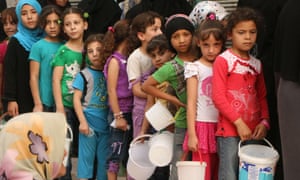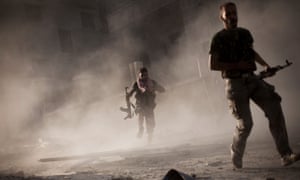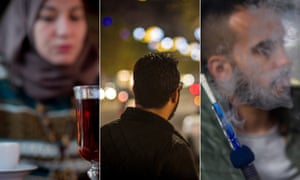
' "You have five minutes to leave the house or we'll burn you in it."
That was the warning the shabiha, thugs supporting Syrian President Bashar al-Assad's regime, gave to Salma* and her family in October of 2012. Salma, her husband, and their four children had been incarcerated in a relative's home for 10 grueling months, most of the time unable to venture into the blasted city streets even to get food. They had become trapped amid crossfire between Assad's army and the rebels while visiting Salma's brother, who lived just a short drive from their own home in Homs, Syria. But after the regime rolled tanks into the city and posted armed guards in office buildings, nowhere in Homs was safe. They fled to live among family in rural Damascus. From there, they began an arduous journey to Jordan, where they would attempt to rebuild their lives.
Salma remembers precisely when her family's life in Syria began falling apart: March 15, 2011, the day that 15 students were arrested for writing anti-Assad graffiti in the southern province of Daraa. Three days later, peaceful protests began in Homs and other cities around the country. As Assad responded with violence, Homs became the stronghold of the opposition and the capital of the Syrian revolution. Salma remembers watching the weekly demonstrations from her kitchen balcony. She says that Addounia TV, the private station reportedly owned by allies of Assad, broadcast scenes of the protests. "Then, as soon as they finished filming, the cameras would be turned off and the demonstrators would be shot at by the regime," she said.
Within months, quotidian tasks — going to the market, to school — became life-threateningly dangerous. A group of older boys armed with sticks began to escort Mariam and her classmates to the elementary school at the end of Salma's street. The violence was so indiscriminate and incessant that anyone could be killed or arrested at any time, Salma said. That fall, a rocket hit Salma's cousin's house. His wife, who had a habit of wearing lots of makeup, lost half her leg. His daughter was killed; his other daughter lost her eye. Salma recalls with horror that the regime-aligned media attempted to discredit the report. The media insinuated that a woman who looked so done-up could not possibly be injured.
In January 2012, Salma and her family set out to visit Salma's brother, who was staying in another area of Homs, a 10-minute drive from her neighborhood. A two-day visit turned into 10 months, however, as going back home was too risky, and the fighting between Assad and the rebels intensified around them. Throughout a siege that left them without water or electricity for six days, Salma comforted her youngest, 4-year-old Bassema, by telling her they would go to heaven soon, where they would all be together and feast. "What can we do? We surrendered to the situation and waited. It was like waiting for death," Salma said. Thugs came and ransacked the town, now nearly empty. Two families who lived there disappeared. Then, in October, came the militiamen warning them that their house would be burned. Salma and her husband left with their children, heading south to rural Damascus. Her brother did not come with them.
The various factions warring over Syria had by now divided the country into territorial lines like creases in a crumpled piece of paper. Every journey by car involved passing through security checkpoints, where armed guards would check their Syrian IDs. At one checkpoint, Assad's army accused Bassema's doll of being a bomb. Bassema became politically savvy: she'd tell Assad's guards she loved them and then, when they'd driven away from the checkpoint, she'd curse them, Salma said.
Salma would later learn by word of mouth that her brother, along with her two uncles and their families, had been slaughtered and burned that winter.
Salma and her family are doing their best to make a life for themselves in Amman, but they have limited economic means and almost no opportunities for work. Without the asylum seeker permits or government cards, they are barred from any aid or assistance from UNHCR or its partners, and are ineligible for the Jordanian public schools available to registered urban Syrian refugees. They are stateless and nameless in the eyes of the Jordanian government, and live in constant fear of being discovered as trespassers. Huda said her 17-year-old brother Mohammed has already been caught and let go twice by police officers who took pity on him.
Salma's dreams for her children are more modest than they were in Syria. She wishes simply for them to be safe and secure, to have basic rights like health care and education. Though they have left the bloodshed and violence behind, the war has forever changed her children. Bassema, for example, plays by drawing pictures of tanks. She's now 7, and talks about violence like a hardened war veteran. "She's always swearing at Bashar al-Assad, saying that he is responsible for everything that has happened to her," Salma said. "She said, 'I want to take rockets and a tank, all the artillery, and go to Bashar and shoot him dead because he took our home.'" When Bassema's grandfather passed away due to health complications in October, Bassema said, "OK, so what? Everyone dies." She has become numb to death.
While most parents can look forward to the successes of their children, war has suspended this natural order of progression. Salma and her husband rely on Mohammed and Huda for financial support, and Mariam and Huda told me they glean what little hope they have from their mother.
"Because of what we have been through, we sometimes feel there really is no hope. No hope in anything whatsoever. We look around us and we can barely make a living and so we feel that's it," Huda said. "We tell her it is impossible for us to continue our studies and she says, 'No.' She always supports us and says, 'You know, there's always a way. God is great and capable of doing anything. You never know, you can always study and learn anything. If you can't continue education now, then you can do so in the future.'"
"Our future is unknown and bleak," Huda said. "We don't how it's going to end." '
























